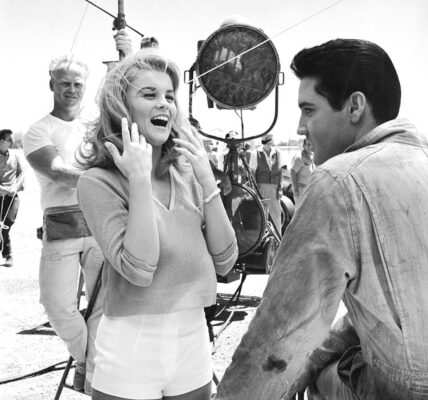Released in 1957, Elvis Presley’s “Mean Woman Blues” stands out as a high-energy rock ‘n’ roll track that encapsulates the raw, fiery passion and distinctive style that defined his early career. Written by Claude Demetrius, the song first appeared in the film Loving You, where Elvis starred as the lead character. With its bold rhythm and fervent lyrics, “Mean Woman Blues” quickly became a quintessential piece of Elvis’s rock ‘n’ roll repertoire, highlighting his unique ability to bring energy and intensity to any performance.

The song opens with pounding drums and electrifying guitar riffs, setting a vibrant tone that immediately pulls listeners in. “Mean Woman Blues” tells the tale of a man captivated by a fierce, passionate woman who, despite her charms, is also a bit dangerous. For many fans, the song remains one of Elvis’s most captivating performances, thanks to the sheer intensity with which he delivers it. It epitomizes the bold, fast-paced rock ‘n’ roll of the era, where intense beats and evocative lyrics conveyed deep emotions about love and desire.
What makes “Mean Woman Blues” particularly memorable is Elvis’s dynamic performance style. His voice is filled with confidence and strength as he sings each line, making it feel as though he’s sharing a personal story. Combining his compelling vocals with his signature stage presence, he elevated the song into an unforgettable experience. Elvis’s moves and distinctive expressions further added to the song’s allure, drawing the audience’s attention and keeping them hooked.

“Mean Woman Blues” represents more than just a song; it was part of a cultural revolution in 1950s music. Elvis’s presence, with songs like “Mean Woman Blues,” helped to define rock ‘n’ roll and usher in a new era for popular music. This track, along with other hits in his collection, solidified Elvis’s place as a cultural and musical icon, leaving an enduring impact on fans and the music industry alike.
Today, “Mean Woman Blues” remains a timeless classic, celebrated not just for its musicality but as a testament to Elvis Presley’s remarkable talent and unmatched style. It is a song that, decades later, continues to remind listeners why Elvis was—and always will be—an enduring symbol of rock ‘n’ roll.


